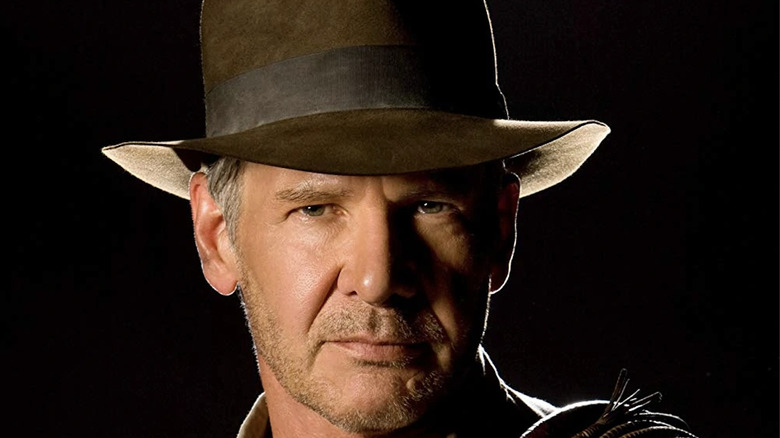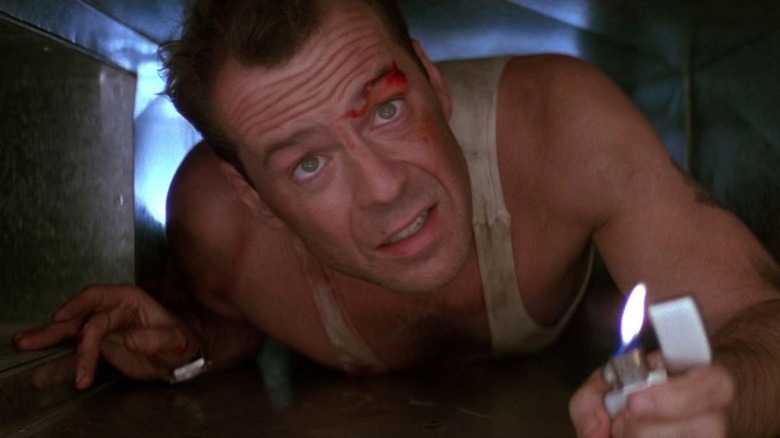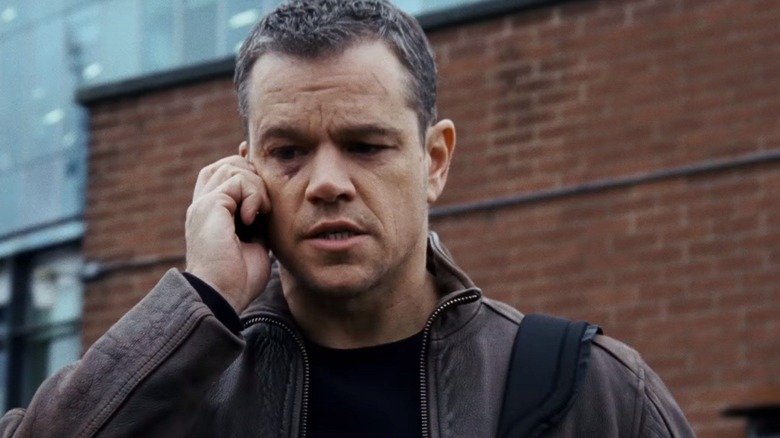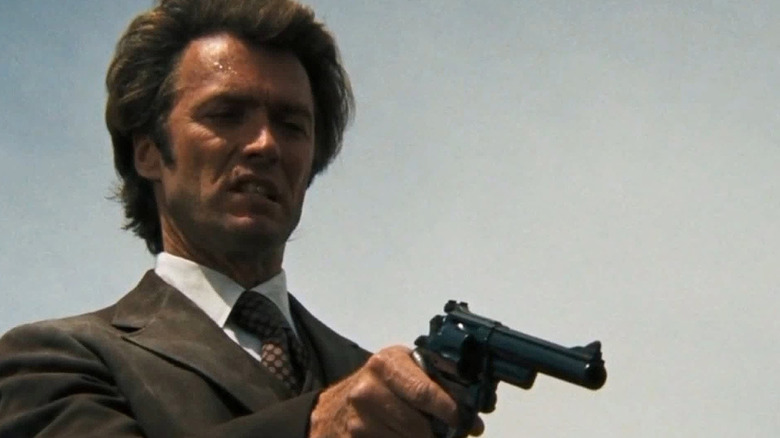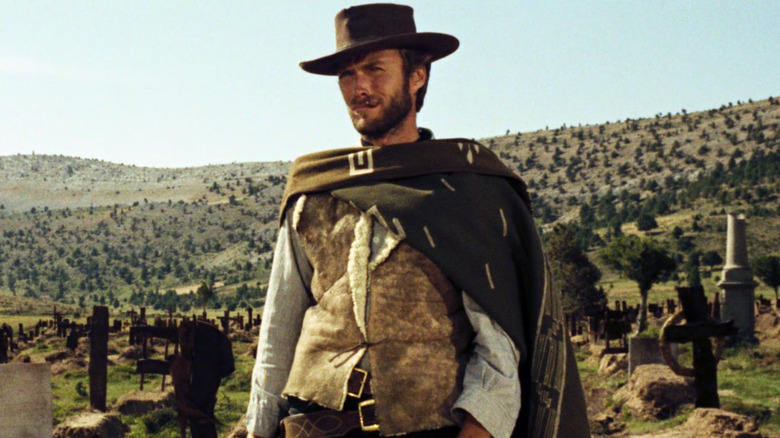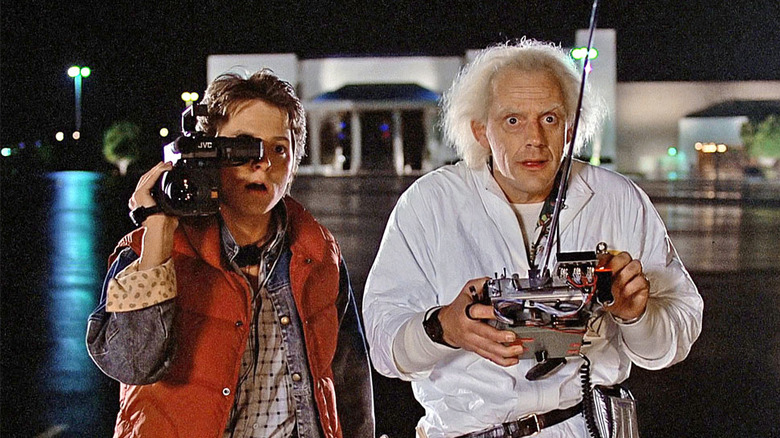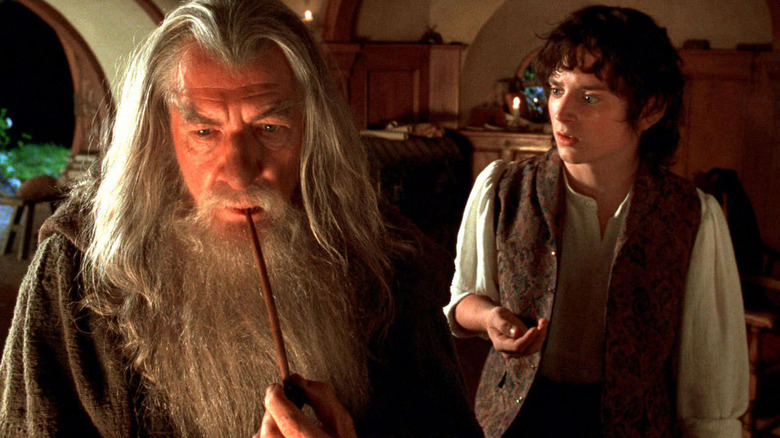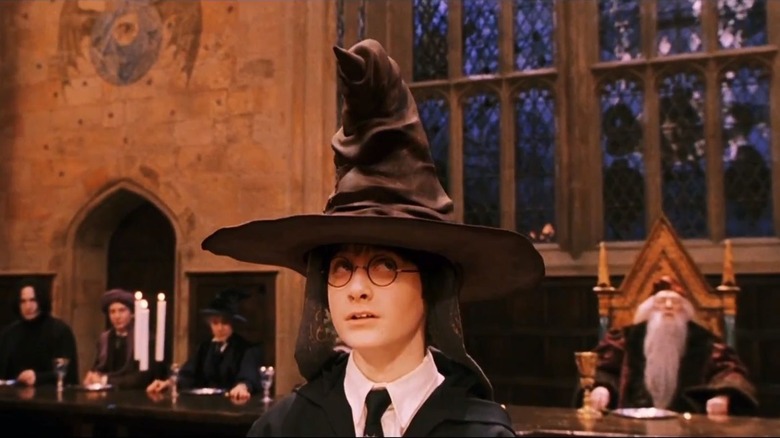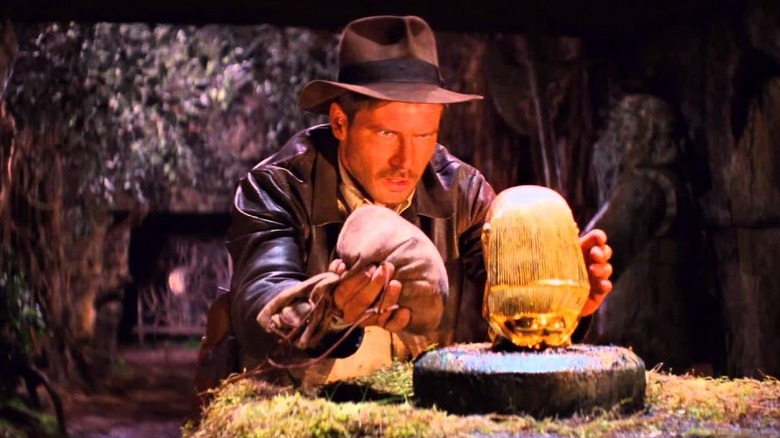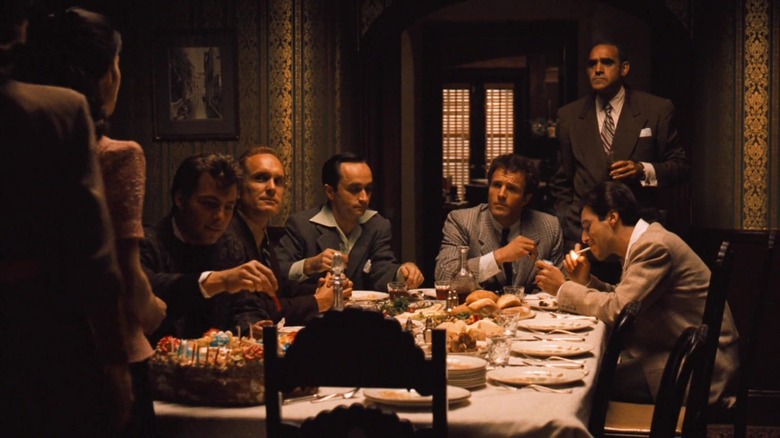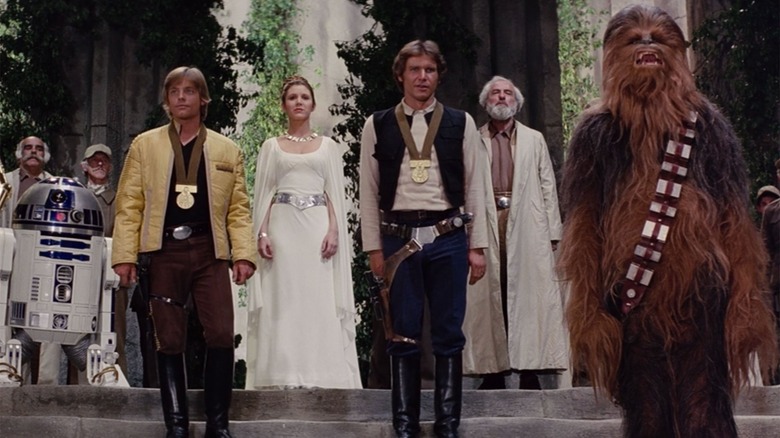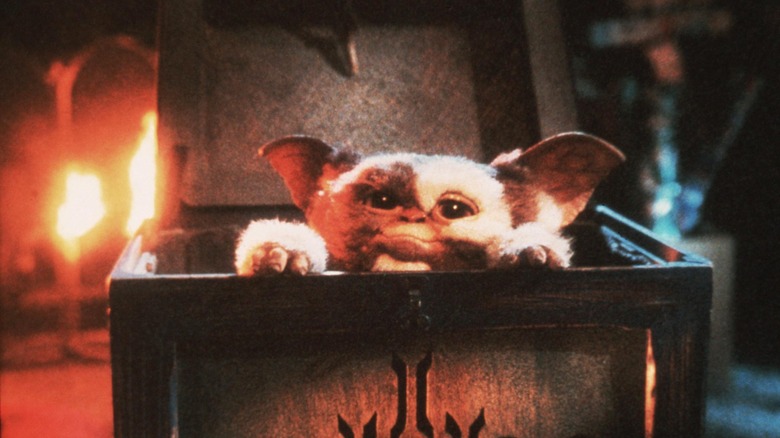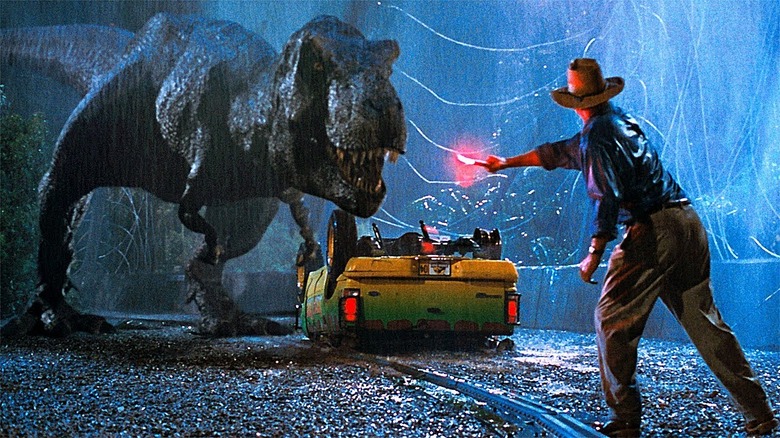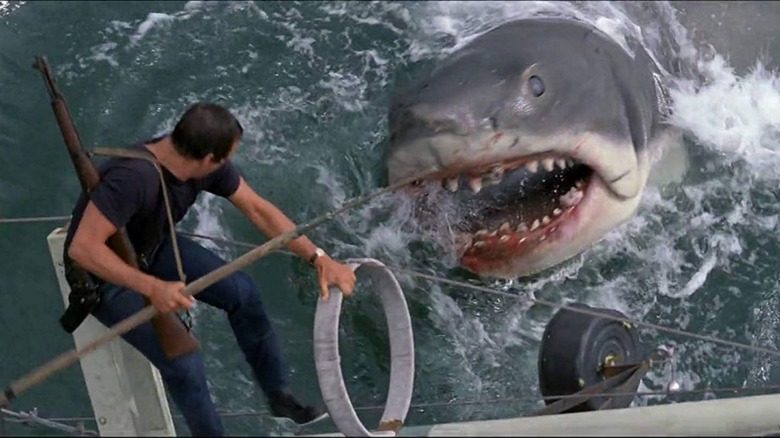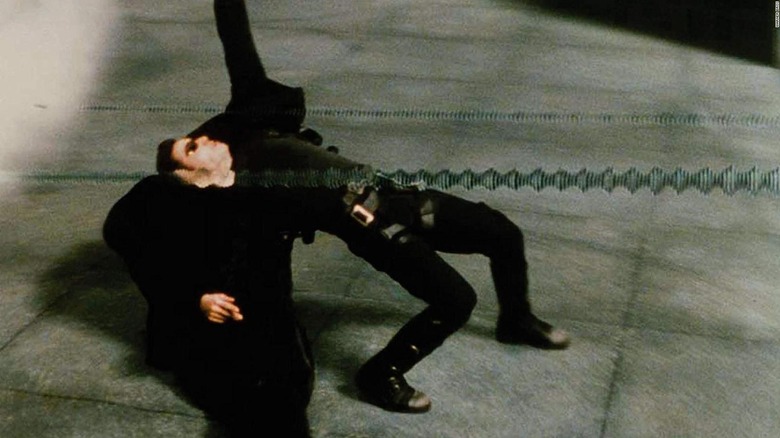Huge Movie Franchises That Hollywood Hasn't Rebooted Yet
Some people decry Hollywood's lack of originality, and one of the most blatantly obvious examples of this supposed culture of bankrupt ideas is the reboot. Not quite a remake, the reboot is a way for the entertainment industry to capitalize on existing "IP" while exercising a freedom to update, re-cast and take it in new directions.
While the reboot may seem like just another attempt for Hollywood to wring as much money as it can out of a beloved series, sometimes reboots ("Battlestar Galactica") or quasi-reboots ( "Cobra Kai," "Ghostbusters: Afterlife") are actually good, making the whole matter even more complicated. When a reboot is given the same care and attention as its originator, and new life is breathed into a series and new fans feel that same rush of excitement as their parents (and/or grandparents) once did, is that really such a bad thing?
That being said, there are some series that just don't need to be rebooted. It's something the folks behind franchises like "The Terminator," "Alien," "Tomb Raider" and "Men in Black" series have learned the hard way in recent years — when a series once captured the right iconic talent at the right time, it's nearly impossible to recapture that lightning in a bottle with someone else. Not that they won't keep trying, however.
With that in mind, below is a list of franchises that would be a waste of everyone's time and money to reboot. Once upon a time, they had the perfect stars and the perfect people behind the camera — and now, for whatever reason, those people have moved on, lost their inspiration to revisit the material and/or are past their creative prime. To paraphrase Idina Menzel: Hey Hollywood, let it go.
Die Hard
The original "Die Hard" is a near-perfect action film that forced other movies in the genre to up the ante in terms of explosions, shootouts, and quips. Debating whether "Die Hard" is a Christmas movie or not has become its own Christmas tradition, but there's one thing all action movie fans can agree on: "Die Hard" is the godfather of the modern action blockbuster.
Looking back now, the John McTiernan film's premise of "he's alone, tired, and the only chance anyone has got" was a stroke of brilliance. In the film's immediate aftermath, Hollywood was flooded by imitators. Decades later, the film that made "Moonstruck" funnyman Bruce Willis a movie star still reigns supreme as the best of the bunch.
Of course, the "Die Hard" franchise is in a bad place these days — taken down not by terrorists, as it turns out, but by its own hand. Remember "Live Free or Die Hard"? "A Good Day to Die Hard"? That last film put McClane in Russia, and most fans could be forgiven for wishing he'd just stay there and retire.
While Bruce Willis' McClane has been an undeniable delight to watch — even sometimes in movies that didn't deserve the "Die Hard" name, Willis is now approaching 70 and has become something of a direct-to-video staple. It would be a mistake to make him once again take off his shoes and put on a dirty undershirt — and it would be an even bigger mistake to take some poor young actor and ask him to become the "new" McClane.
The Bourne Franchise
Based on the series of novels by Robert Ludlum, the "Bourne" films depicted Jason Bourne, a CIA assassin suffering from dissociative amnesia, portrayed by Matt Damon. The series has already inspired five films, a brief TV spinoff — and perhaps, the action movie trend of editing shaky action scenes in ways the audience will never get a good look at the fight choreography.
The "Bourne" franchise has gone on to gross more than $1.6 billion around the globe, garnering mostly positive (albeit, less so in seemingly each iteration) reviews. Bourne became an American-ized James Bond, and the result was an engaging story, thrilling suspense, and use of practical effects and stunt work thanks to the efforts of talented folks like Doug Liman, Tony Gilroy and Paul Greengrass. Of course, "Bourne" also gave Matt Damon a signature role, one that turned him into an international action star.
In some ways, "Bourne" has already been rebooted, albeit in a Hollywood way that equates to dipping your small toe into a swimming pool to see if the water temp is inviting. In resounding fashion, audiences have given an icy response.
2012's "The Bourne Legacy," which cast a just-starting-as-"Hawkeye" Jeremy Renner as an on-the-run black ops agent whose story is influenced by Damon's previous adventures, hovers in the mid-50s on RottenTomatoes by critics and audiences alike; if you've forgotten that the franchise produced a Damon-less 2019 TV prequel called "Treadstone," consider yourself lucky.
Dirty Harry
This gritty series began in 1971 with "Dirty Harry," followed by 1973's "Magnum Force," 1976's "The Enforcer", 1983's "Sudden Impact", and 1988's "The Dead Pool," all of which chronicled the grimy adventures of San Francisco Police Department Homicide Division Inspector "Dirty" Harry Callahan. As crafted by Clint Eastwood, Callahan was a tough, hard-nosed cop with no time for bureaucratic red tape, bleeding-heart hippies or chummy partners who would only slow down his one-man-mission to wipe crime off the streets in a city seemingly overrun by rapists, drug dealers, and thugs.
Some critics saw the films as nothing short of fascist, but the "Dirty Harry” films were a hit at the box office. The Don Siegel-engineered template was very much a product of its era, reflecting society's tug-of-war at the time between free-loving idealogues and tough-on-crime conservatives in the aftermath of the Manson murders and the Zodiac killings. Nevertheless, as nihilistic as it may sound, audiences in the '70s responded to the primal, cathartic sight of a police officer with a really big gun, holding the scum of the earth accountable at the other end of it.
All these decades later, Eastwood is so closely tied to the role that it's hard to imagine anyone else fitting into his cranky, tight-lipped shoes. Are these times ripe for a similar political/police commentary that comments on modern law enforcement? Sure, but let some new writer create new characters to explore the theme. Clint is still pushing along, throwing punches in "Cry Macho" at age 91 — but unless he comes up with some brilliant way to say goodbye to this iconic character a la "Unforgiven," it's best to let Harry holster his .44 Magnum for good.
The Man With No Name Trilogy
Speaking of "Unforgiven," most people saw that four-time-Oscar-winning Eastwood-directed film as an unofficial goodbye to (and a final word on the repercussions of the violent life led by) The Man With No Name. While not a franchise in the classic sense (then again, it was the early '60s, so film "franchises" were few and far between), Sergio Leone's "A Fistful of Dollars," "For a Few Dollars More," and "The Good, the Bad and the Ugly" focused on this Eastwood institution while earning a well-deserved reputation as not only some of the best westerns ever made, but some of the best movies ever made.
The films were made entirely in Italy, with a largely Italian cast and crew, as Eastwood attempted to navigate a post-"Rawhide" crossover into a film career. Series creator Leone managed to forge a distinctly American mythology, while also employing a more artistic style from the European film tradition.
These films offer would-be rebooters the insurmountable double whammy of an iconic performance and iconic filmmaking. For anyone to even go near this third rail would feel on par with Gus Van Sant remaking "Psycho," so it seems unlikely that even the most money-hungry executives in Hollywood would dare touch them. You'd also have Eastwood to contend with — and he doesn't seem like the type of guy who'd quietly allow such a trampling on his legacy.
Back to the Future
The "Back to the Future" series is so beloved by fans and critics it might as well be printed on legal tender. The wacky sci-fi comedy series followed time-traveling high school student Marty McFly (Michael J. Fox) and eccentric scientist Emmett "Doc" Brown (Christopher Lloyd) as they tinkered with the very fabric of their own realities in clever, funny, endlessly-watchable ways. Not only do these films seem to continue getting more popular somehow, all these decades later, but they also seem less and less likely to ever be remade without a massive outcry from the fanbase.
The original series was handled with such care, capturing Michael J. Fox at his prime (turn down the volume and simply watch his physicality, it's an absolute masterclass), that trying to recapture it would be as foolhardy as using the Grays Sports Almanac to go back in time and place a bet. In addition to the charming characters and hilarious situations, the amount of care paid to the various timelines still inspires "Details You Missed" articles decades later.
Thankfully, it doesn't look like there will be any reboots in the "Future." In 2015, series director and co-writer Robert Zemeckis said audiences are safe for as long as he and co-writer Bob Gale are still alive. "That can't happen until both Bob and I are dead," he explained. "And then I'm sure they'll do it, unless there's a way our estates can stop it."
The Lord of the Rings
This one is another bit of a cop-out — does "The Hobbit" trilogy count as a reboot, or a continuation? — but the original "Lord of the Rings" film trilogy ("The Fellowship of the Ring," "The Two Towers," and "The Return of the King") is unlikely to be full-on rebooted anytime in the near future, even if a TV series in the same realm is on the way.
The early '00s, Peter Jackson-helmed movies became so popular that they would have probably won if they ran for president. Not only did Jackson stay extremely faithful to J.R.R. Tolkien's classic fantasy series, but he also developed numerous revolutionary special effects techniques while making the films, with each installment winning the Academy Award for Best Visual Effects and the third film even winning Best Picture — an unprecedented achievement for the third film in a trilogy.
That trilogy, of course, was followed by the "Hobbit" films (with Jackson taking a page out of the George Lucas playbook while making a prequel trilogy after the first trilogy), which didn't fare quite as well with audiences. However, these two trios of films have contributed so much to the film industry and pop culture that the idea of rebooting them into further films feels unthinkable. You'd certainly, at the very least, need Jackson's approval – as well as source material from Tolkien, who died in 1971.
Which brings us to the hundreds-of-millions-of-dollars-budgeted "Lord of the Rings" series Amazon is currently hard at work on. It takes place before the events of both "Lord of the Rings" and "Hobbit" trilogies, and has the approval of Peter Jackson. Although not technically a reboot, it's another example of a franchise avoiding the word while striving to create a self-sustaining slice of IP that reinvents, reinvigorates and re-asserts itself without end.
Harry Potter
The "Harry Potter" film series is one of the highest-grossing franchises of all time, unsurprising considering it is based on one of the most popular book series of all time. Consisting of eight movies, beginning with "Harry Potter and the Philosopher's Stone" in 2001 and culminating with "Harry Potter and the Deathly Hallows — Part 2" in 2011, the series appeared once upon a time to have concluded. But between the ongoing "Fantastic Beasts" series (which will supposedly have five films), the recent reunion special, Universal Studios' "The Wizarding World of Harry Potter" and enough merchandising to make KISS cry, the question is more like: Will Harry Potter ever be rebooted, or has it spent the past decade quietly rebooting itself?
Ultimately, most fans would quantify a "reboot" as a wiping away of the previous continuity to make way for a new one. This seems unlikely to happen anytime soon. Because the books continue to be so beloved by fans of all ages, a reboot would have to somehow make a distinct path from the movies, while staying true to the books to which they so slavishly based themselves upon. That seems like it would indeed be a very difficult spell to cast.
Indiana Jones
Since 1981, the "Indiana Jones" franchise has followed the globe-trotting exploits of Dr. Henry Walton "Indiana" Jones, Jr., a professor of archeology who hunts for mystical objects — when he's not boring students at the university where he teaches, which has somehow never caught wind of the countless international laws he has violated in his spare time.
Over the course of a largely cherished trilogy from the '80s, a panned 2008 sequel, and a respected-but-largely-forgotten TV series in the '90s, audiences followed Jones as he searched for ancient artifacts around the world, happily punching any Nazi, commie, or ancient curse that got in his way. The brainchild of cinema giants George Lucas and Steven Spielberg, the films updated classic adventure movie serials with bigger budgets, action scenes, and special effects.
As it turns out, there is little need to reboot the "Indiana Jones" franchise because 79-year-old Harrison Ford isn't ready to hand over the whip just yet; for better or worse, a fifth film is on the way. There were rumors of Chris Pratt taking over the role a few years back that didn't amount to anything — and as for future filmmakers, if you're crazy enough to think you can do better than Spielberg, Lucas and Harrison Ford, and step over all the carcasses of those who've tried and failed, good luck with that.
The Godfather
While there will always be plenty of debate about which of the first two "Godfather" films is the superior one (most agree the third one can be stricken from the record), the general consensus is that they are some of the greatest films ever made. Based on Mario Puzo's bestselling 1969 novel, the film series (which Puzo co-adapted with director Francis Ford Coppola) tells the story of the Italian-American Corleone crime family and its patriarch Vito Corleone as he rises to become a major figure in American organized crime and how his youngest son, Michael Corleone, becomes his successor.
The movies reinvented the crime film genre and turned what in lesser hands could've been a generic potboiler into a massive epic about family, betrayal, power, and greed. Packed with classic scenes and lines, and inspiring a host of imitators that continues today, the "Godfather" films will go down in history as among the high points of American cinema.
Then there was the amazing cast: Marlon Brando, Al Pacino, James Caan, Diane Keaton, Robert De Niro, John Cazale and more elevated the material while creating career-defining roles. If Hollywood ever dared to reboot a series that is essentially cast in solid gold, there's a good chance that studio head would wake up with a horse head under his sheets.
Star Wars
The "Star Wars" franchise needs no introduction, which is a credit to its everlasting power considering it has been going strong since before most of its fans were even born. Not only one of the most cherished and lucrative film franchises of all time, "Star Wars" launched a veritable empire of storytelling that spread into video games, novels, comic books, and more.
Then there's the merchandising. Before "Star Wars" hit screens in 1977, it was rare for films to be marketed to children through lunchboxes, action figures, t-shirts, and the like. But now, it's the norm. Who knew that a simple story about an estranged family set in space could be so influential?
While some of the recent films have become divisive among fandom, the love for the original trilogy remains strong, and heck, even George Lucas' controversial prequel trilogy is starting to receive some belated love. Also worth noting is the popularity of the series' foray into television with Disney+'s "The Mandalorian" and "The Book of Boba Fett."
Even though the series as a whole has experienced some bumps, it would be foolhardy to simply wipe all of "Star Wars" blank and start casting new actors as Luke Skywalker and Han Solo to tell tales that contradict all we've seen on screen before. In fact, if there's one series on this list whose continuity seems untouchable — simply because the universe is big enough to tell more stories rather than re-tell the old ones — it would be "Star Wars."
Gremlins
1984's Steven Spielberg-produced, Joe Dante-directed "Gremlins" was a massive hit with audiences, telling the story of a young man who receives a strange creature as a pet, which then spawns other creatures who transform into small, yet aggressive monsters that wreak all kinds of adorable havoc in a small town during Christmas. The first film became a cultural phenomenon, resulting in merchandising and a place in the pop culture zeitgeist alongside "E.T. the Extra-Terrestrial". While 1989's off-the-wall sequel "Gremlins 2: The New Batch" didn't live up to the success of the first, it has its fans.
There hadn't been much activity in the franchise until fairly recently. In February 2021, a Mountain Dew Zero Sugar ad featuring original series star Zach Galligan and Gizmo was released, the Gremlins popped up alongside other beloved characters in the crowd scenes of "Space Jam 2: A New Legacy," and HBO Max will soon release an animated prequel series, "Gremlins: Secrets of the Mogwai" with Dante contributing in a consulting role.
While the "Gremlins" franchise doesn't have quite the same fandom as many of the other titles on this list, or any significant stars whose replacing would inspire rioting in the streets, that might very well be what makes it perfect for a reboot.
Jurassic Park
Steven Spielberg's "Jurassic Park" series chronicles scientists' attempts to play god ... only to get eaten in the end. That's the series in a nutshell, and the formula has repeated some variation on itself 5 times now, with "Jurassic World Dominion" on the way.
So, why would anybody be talking about a reboot now? Weren't 2015's "Jurassic World" and 2018's "Fallen Kingdom" reboots with Chris Pratt and Bryce Dallas Howard? Technically, no (they still exist in the same continuity as the original films), but ostensibly yes. To further complicate matters, "Dominion" features appearances by original series stars Sam Neill, Jeff Goldblum and Laura Dern, doubling down on the "this is not a reboot" slippery slope of modern-day blockbusters.
Because these new "Jurassic" films are so reliant on fans' nostalgia for the initial entry, because they are still making money and because Spielberg has stuck around as an executive producer, Hollywood won't be completely scrapping this existing continuity anytime soon. Someday, they'll likely get around to it, but to paraphrase Goldblum's Ian Malcolm character: "Just because you could, doesn't mean you should."
Jaws
Before there was a series of movies about sharks attacking from tornados, there was a series of movies about sharks attacking from more traditional vantage points, such as large bodies of water.
Steven Spielberg's 1975's masterpiece "Jaws," considered by some to be among the greatest movies ever made, has the unique distinction of being the original summer blockbuster. All these years later, Hollywood is still chasing blockbusters like Quint pursuing a great white, and would love to put the well-known name "Jaws" in front of one of them.
Then again, the formula has been taught multiple times: Jaws — Spielberg = no good. 1978's "Jaws 2," 1983's "Jaws 3-D," and 1987's "Jaws: The Revenge" were all digested and spit back up by unsatisfied audiences, as the series kept jumping the shark (ahem) with each new installment, relying on gimmicky 3-D or even giving the great white shark some kind of unexplained psychic connection to its victim.
Spielberg declined an opportunity to produce a "Jaws" remake in 2021, said in 2011 he had walked away from "a huge part of my life that I helped create," and in 2015 said he would "never remake" his own films.
"I would never remake one of my own movies — starting with 'Jaws,'" he said. "I would never remake 'Jaws.'"
But a reboot? Like a swimmer with a fin circling, you probably shouldn't bother holding your breath.
The Matrix
1999's "The Matrix" was the perfect blend of science fiction, action, groundbreaking visual effects, and high-impact storytelling. It remains one of the most vivid depictions of the dangers of artificial intelligence, a defining film in the cyberpunk subgenre. "The Matrix" wasn't just a hit sci-fi action flick; it was a pop culture landmark whose influence can still be felt today.
Unfortunately, the film was followed up by three sequels (including 2021's "The Matrix Resurrections") that failed to live up to the first film's promise. Various attempts in animation, comics, and video games projects have also been set in the same universe and been disappointing to various degrees. So, where does it all go from here?
It's no secret that by 2015, Lilly Wachowski was calling the idea of more "Matrix" movies a "particularly repelling idea" while Lana believed the studio was looking to replace them; Lana seemingly made "Resurrections" because it was otherwise destined to be rebooted without Wachowski involvement (and there are many jokes in "Resurrections" indicating as much).
"Yeah. That was real," producer James McTeigue said of 2017 rumors that included reboot talks starring Michael B. Jordan. "There were versions out there. But I guess the fates dictated that Lana's story came at the right time, and Warner Brothers were willing to move forward with that story."
In the same interview, McTeigue seemed to indicate that "Resurrections" would be the final word the Wachowskis had on the franchise. "We've got no prequel in mind. We've got no sequel in mind," he said. "We've got no further trilogy."
Which would seem to put the "Matrix" franchise right back where it was in 2017, with a floundering franchise ("Resurrections" was largely viewed as a disappointment both critically and financially) and a studio wanting to return it to glory — ripe conditions for a reboot. Perhaps somebody at Warner Bros. is scrambling through a desk drawer right now, trying to remember where they put Michael B. Jordan's phone number.
